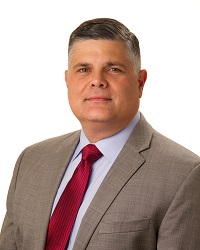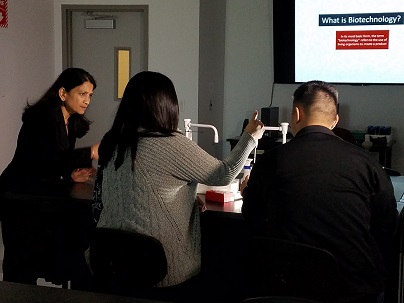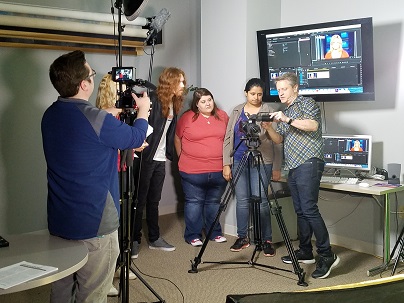New Programs at UH Sugar Land Campus

Dr. Jay Neal, assistant provost of academic affairs and operations.
The spring semester unveiled a number of new programs at the University of Houston Sugar Land Campus, some unique to this campus, all intended to build on the momentum that began when UHSL became an institute of the University of Houston.
“We are all UH. We are all Coogs, and we are all excited about growing our programs, our faculty and our student body,” said Jay Neal, assistant provost of academic affairs and operations for UH Sugar Land Campus. “These programs are good for UH and good for Sugar Land and Fort Bend County.”
Biotechnology
Led by Professor Rupa Iyer, the biotechnology program features new state-of-the-art facilities and laboratory space. The program is the first accredited biotechnology program in the country (Association of Technology, Management and Applied Engineering).
The program is designed on three principles:
- Interdisciplinary: two curriculum tracks--one in biomanufacturing and the other in bioinformatics--provide a broad exposure to the field;
- Connection to industry-relevant issues: three new regulatory courses were developed for the program and,
- Undergraduate research: the laboratory curriculum developed in collaboration with industry and academic partnersuses a pesticide degrading bacterium, Brevundimonas diminuta, as an anchor organism to demonstrate the life-cycle of a typical biotechnology product.

Dr. Rupa Iyer with biotechnology students
“Students will get hands-on experience on modern biotechnology techniques as they conduct environmental sampling research and contribute to scientific data on the location and distribution of pesticide degrading activity,” Iyer said. “Our ‘Bioprocessing Lab’ class is the only such course for undergraduates in the state of Texas.”
Innovation and Opportunity Development
Professor David Crawley teaches students to think differently, leading them to discoveries, strategies and successful commercialization of ideas. His class, Innovation and Opportunity Development, is a new elective at UHSL that uses proven engineering principles of processes and methodologies to organize brain stimuli to create innovation.
“Innovation has always been regarded as the domain of the gifted few, but these processes allow the average person to be innovative by working and learning to stimulate their thinking,” Crawley said. “Many businesses use these processes (like Fluor, Humana, Schlumberger), as do artists, academics and management professionals.”
The class is designed in three parts: Innovation Development, Communications and Commercialization.
Crawley says the class is not about philosophy, but structured systems that pioneer fresh ideas. He draws on his own experience in the advertising industry and invites area professionals from the Fort Bend industries to share theirs. He said businesses are looking for students who can develop innovations--a problem solving capability.
Introduction to Liberal Studies
Professor Thomas Behr believes all great thought comes from examinations of many schools of thought.
“This is the heart of Liberal Studies, multidisciplinary studies, to create students who are critical thinkers because they know how to learn. They become life-long learners,” he said. “It’s not really critical thinking; it’s just thinking.”
The Introduction to Liberal Studies is a new elective at the UH Sugar Land Campus with part web instruction and part face-to-face seminar. It also is a new degree program with Bachelor of Arts and Bachelor of Science options.
While the introductory class is required for Liberal Studies majors, it is open to all majors and is a core credit for language, philosophy and culture.
“This course and this major help students understand an issue from various viewpoints. From a psychologist or a poet or an ethicists, for example,” Behr said. “There’s been much that’s wonderful in the world that’s been the result of specialization, but integrating knowledge is a growing problem. We have a lot of specialists with no understanding of how things fit together.”
The course focuses on the work of Mortimer Adler, the philosopher, scholar and author.
“A recent survey of CEOs indicates they want and need people who can be analytic readers and thinkers,” Behr said. “This class advances analytic thinking, reason and logic. It elevates understanding.”
Transmedia
Transmedia describes a process in which unique elements of a story are conveyed over many platforms, such as print, video, videogames, social media or live events. Consumers can interact with the story on any or all those platforms.

Professor Phil Snyder with digital media students
This fall, the UH Digital Media program will partner with First Colony Church of Christ in Sugar Land to offer a new class called Venue Transmedia.
“Live events in large venues such as mega-churches, stadiums, concert halls or indoor arenas, can be excessively complicated, requiring a skilled professional to operate the multiplatform media systems,” said Phil Snyder, associate professor of information and logistics technology. Snyder and his wife, Karen, have pioneered the transmedia training within the Digital Media program. Karen Snyder teaches Transmedia classes at the UH Sugar Land Campus. “This class will be in an actual live-event auditorium with state-of-the-art equipment.”
Richard Bowling is the producer of all Sunday services at First Colony Church of Christ, which includes live video and audio, as well as all aspects of live streaming. He’ll collaborate with UH to offer a “production lab” for students who’ll have access to the High Definition production suite at the church.
“These different positions require high levels of skill to produce quality. The difference is that the tools are much more available and affordable,” Bowling said. “Experience to learn the basic techniques required to become skilled with the various tools is more accessible, with smaller venues using many of the same tools as a large venue.